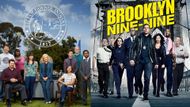Superstore turned something ordinary into something memorable. Just a store, Cloud 9, but not really. Shelves, uniforms, random customers. It looked simple at first. Then came the humor, the small conflicts, and the odd friendships. That mix is what made it different, and maybe why it stayed in people’s minds.
It was never only about jokes. There was always a sense of recognition, almost like watching co-workers who could exist anywhere. That made it feel close, familiar. When the show ended, the gap was obvious. And then came the search for others with the same spark. Not identical, of course, but carrying pieces of that spirit. Shows that can blend absurdity with something real, comedies that make the routine look sharper.
Parks and Recreation
The town of Pawnee, Indiana, is the stage. Not glamorous, not big. Just a parks department. Leslie Knope, Amy Poehler’s character, throws all her energy into the smallest projects. A bench, a park, a festival. She makes it feel larger than it should be. That exaggeration turns into comedy. And the team around her gives the same energy that a group in Superstore once had. Everyone has their quirks, but still working together. Episodes stretch from awkward council meetings to improvised community events, showing how the smallest bureaucratic detail can grow into something hilarious.

Brooklyn Nine-Nine
The 99th precinct. A police station in Brooklyn. On paper, it sounds serious. Yet the show is pure comedy. Jake Peralta constantly breaking rules, Holt standing still like nothing ever moves him. That contrast builds the rhythm. The setting does not change much, but the characters keep it alive. Fans of Superstore will notice the same type of group energy, only now with badges, handcuffs, and crime scenes. Episodes shift quickly from high-stakes cases to petty squabbles in the bullpen, reminding viewers that humor often hides inside the routine.
Abbott Elementary
This one shifts to a public school in Philadelphia. Teachers trying, failing, and trying again. Short budgets, crowded classrooms, too many things to fix. The mockumentary style makes it feel close, almost real. Problems that seem small grow into full episodes of humor. And between the laughs, a reminder of the dedication required. In a way, it works like Superstore: ordinary workers carrying on, even when nothing seems to help. The teachers’ determination, often clumsy but genuine, mirrors the same resilience that made Cloud 9 employees so engaging to watch.

Party Down
In Los Angeles, Party Down follows a catering crew. Every week, a different event: weddings, Hollywood parties, corporate launches. New rooms, new clients, but the same faces holding trays and pretending this is temporary. Most of them want to be somewhere else, chasing acting or writing careers. That tension creates both frustration and comedy. It feels familiar to anyone who watched Superstore, where a “temporary” job slowly became a strange kind of family. The series thrives on this duality: the glitzy events in front, the exhausted staff in the back. That split is what makes it resonate.
St. Denis Medical and the legacy of Superstore
A hospital this time. Underfunded, stretched thin, still trying to stay open. St. Denis Medical comes from Justin Spitzer, the creator of Superstore, with Eric Ledgin. The style is mockumentary again, with fast dialogue, quick glances, and chaos turning funny. It is still new, still unfolding. But the connection to Spitzer already draws attention. The shift from retail aisles to hospital corridors changes the scenery, not the essence. The humor still grows out of everyday breakdowns. Each character has a role to play, from overworked doctors to administrators who barely manage to keep the lights on. The promise is clear: a mix of absurd moments with a reflection of real challenges.

Conclusion
Superstore proved that even the most ordinary workplace can hold stories worth telling. It was never just about checkout lines or sales. It was about people, their flaws, and their small victories. Other shows picked up that same thread in their own way. Parks and Recreation in local government, Brooklyn Nine-Nine in a police station, Abbott Elementary in a school, Party Down in catering, and St. Denis Medical in healthcare.
They all follow different routes. Yet the core stays the same. Workplaces can be more than background. They can show connection, conflict, and laughter. And sometimes they reveal more than expected. Among aisles, classrooms, events, or hospital wards, these stories remind viewers that ordinary days can carry humor and meaning. And maybe that is the secret: it is never really about the job itself but about the people inside it, shaping something larger than routine.
